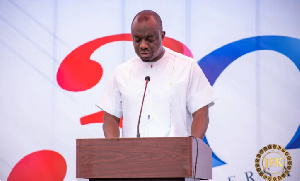- ADDI SELF
- Akomapatrendz
- Alwgh
- Attractive Mustapha NII Okai Inusah
- BigAyehMedia
- Black Hyacinth
- Dangote The Blogger
- Dessert Bloggers
- Dprah
- Ebanbo
- Ella Okunmwendia
- Geniuskojo
- GH Kasa
- Gnews
- Gnewspage
- Gospel News GH
- HypeLords GH
- Kasoa Blogger
- Knews
- Lifeofkiki
- Lizzy1
- Mercyma
- MilanoTheBlogger
- Mira
- Musings of a SHOE
- MyHairDo
- Mystic Wanderer
- Rocky55
- ROSIS
- Showbiz Blogger
- Shyblogafrica
- SirIshmael93
- Talentz MEDIA
- The Big E
- Todays Vibes
- TrenderHQ
- Ugly Game News
- Ummis Vlogs
- Viral Lifestyle
- Xorlali
Rocky55 Blog of Saturday, 11 November 2023
Source: Isaac Appiah
Akwete Makes a Return

Nigeria have an exotic array of local fabrics you can explore for your next outfit or collection. Sometimes last year, the former Abia State Governor, Okezie Ikpeazu salutes Charles Chukwuma Soludo, the democratically elected Governor of Anambra State for chosen to use the Abia-made Akwete Cloth as his official apparel.
The Abia Governor described the Akwete Cloth as one of Igbo land’s most enduring gifts to the world of textile manufacturing. From Adire to Aso-Oke, Aakwete, and many others, indigenous textile is not lacking in the country. In Nigeria, cloth weaving is universally practiced in most urban areas and cities like Abeokuta, Ilorin, Iseyin, Akwete, Okene, Benin, Sokoto, Borno, Kano, Bida and Iseyin area among others. Raffia and cotton are most-widely used in cloth-weaving in Nigeria.
The Igbo are known widely for Akwete-cloth weaving which is basically done by women. Akwete cloth is a special woven fabric by Igbo women in Akwete area, near Aba in Abia State. It is originally referred to as “Akwa Miri” (Cloth of the water) meaning towel. Akwete cloth weaving is said to be as old as the Igbo nation.
Because of the dexterity of the weavers who demonstrate great mastery of technique and beauty of design, the art of Akwete-cloth weaving was erroneously believed to have been introduced from Okene in Kogi State where a similar but highly-developed style earlier existed. However, Akwete cloth comes in different colours and designs. Some are in the patterns of red and black designs, interwoven in geometric patterns on the white ground which is favoured by Igbo men.
TIPS
The Akwete clothes, woven from sisal-hemp fibres are of coarse type, used by masqueraders, and by warriors as headgears, while those made from raffia fibres are used on religious occasions like the Ozo titleship, and for mourning by women.
The Akwete fabric is almost always playful with colours and the traditional Igbo weaving demonstrated in its making processes sisal-hemp, raffia and spun cotton into finished product on a wide vertical loom.
The coarse raffia materials were used by masquerades and in the past as head gear for warriors and the more comfortable and colorful spun cotton is used to weave cloth for everyday wearing.












